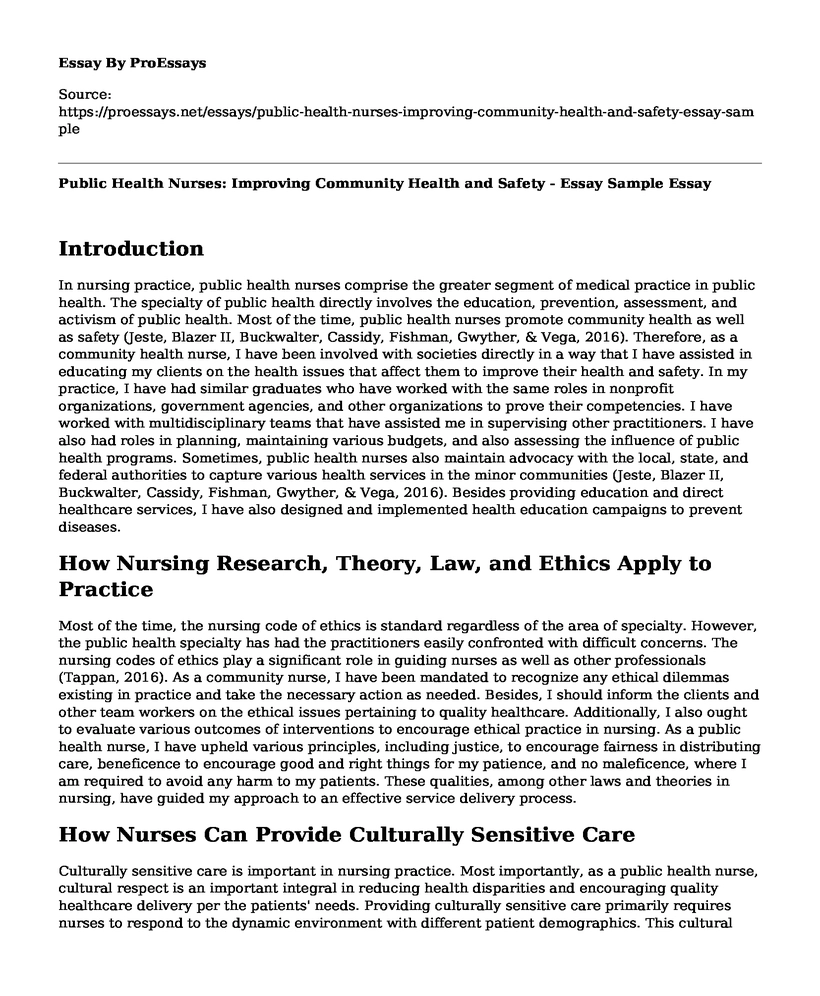Introduction
In nursing practice, public health nurses comprise the greater segment of medical practice in public health. The specialty of public health directly involves the education, prevention, assessment, and activism of public health. Most of the time, public health nurses promote community health as well as safety (Jeste, Blazer II, Buckwalter, Cassidy, Fishman, Gwyther, & Vega, 2016). Therefore, as a community health nurse, I have been involved with societies directly in a way that I have assisted in educating my clients on the health issues that affect them to improve their health and safety. In my practice, I have had similar graduates who have worked with the same roles in nonprofit organizations, government agencies, and other organizations to prove their competencies. I have worked with multidisciplinary teams that have assisted me in supervising other practitioners. I have also had roles in planning, maintaining various budgets, and also assessing the influence of public health programs. Sometimes, public health nurses also maintain advocacy with the local, state, and federal authorities to capture various health services in the minor communities (Jeste, Blazer II, Buckwalter, Cassidy, Fishman, Gwyther, & Vega, 2016). Besides providing education and direct healthcare services, I have also designed and implemented health education campaigns to prevent diseases.
How Nursing Research, Theory, Law, and Ethics Apply to Practice
Most of the time, the nursing code of ethics is standard regardless of the area of specialty. However, the public health specialty has had the practitioners easily confronted with difficult concerns. The nursing codes of ethics play a significant role in guiding nurses as well as other professionals (Tappan, 2016). As a community nurse, I have been mandated to recognize any ethical dilemmas existing in practice and take the necessary action as needed. Besides, I should inform the clients and other team workers on the ethical issues pertaining to quality healthcare. Additionally, I also ought to evaluate various outcomes of interventions to encourage ethical practice in nursing. As a public health nurse, I have upheld various principles, including justice, to encourage fairness in distributing care, beneficence to encourage good and right things for my patience, and no maleficence, where I am required to avoid any harm to my patients. These qualities, among other laws and theories in nursing, have guided my approach to an effective service delivery process.
How Nurses Can Provide Culturally Sensitive Care
Culturally sensitive care is important in nursing practice. Most importantly, as a public health nurse, cultural respect is an important integral in reducing health disparities and encouraging quality healthcare delivery per the patients' needs. Providing culturally sensitive care primarily requires nurses to respond to the dynamic environment with different patient demographics. This cultural knowledge can be expanded through employing various sources, including seminars, nursing workshops, and presentations. Additionally, nurses can encourage a culturally competent environment by encouraging cultural awareness, where they self-examine their professional backgrounds (Kohlbry, 2016). Cultural skills also play an important role in ensuring that nurses can collect only relevant cultural data for their patients. A cultural encounter may also work where nurses get involved with cross-cultural relations with their patients from differing backgrounds (Kohlbry, 2016). Finally, nurses could show a cultural desire where they get motivated to become culturally aware of their environment. This would require the practitioners to be willing and open to other people and also accept the prevailing cultural differences. Public health services can be classified with critical care units; hence, the importance of having a culturally sensitive care. In my community health practice, I have had to interact with diverse racial and ethnic communities that have demanded my attention to encourage positive health outcomes.
References
Jeste, D. V., Blazer II, D. G., Buckwalter, K. C., Cassidy, K. L. K., Fishman, L., Gwyther, L. P., & Vega, W. A. (2016). Age-friendly communities initiative: public health approach to promoting successful aging. The American Journal of Geriatric Psychiatry, 24(12), 1158-1170.
Kohlbry, P. W. (2016). The impact of international servicelearning on nursing students' cultural competency. Journal of Nursing Scholarship, 48(3), 303-311.
Tappan, R. (2016). Advanced Nursing Research: From theory to practice (2nd Ed). Sudbury, MA: Jones and Bartlett
Cite this page
Public Health Nurses: Improving Community Health and Safety - Essay Sample. (2023, Apr 19). Retrieved from https://proessays.net/essays/public-health-nurses-improving-community-health-and-safety-essay-sample
If you are the original author of this essay and no longer wish to have it published on the ProEssays website, please click below to request its removal:
- Miracles in Medicine Essay
- The Connection Between Psychology and Physical Therapy in Sports/Athletes - Essay Sample
- Essay on Staff Burnout & Compassion Fatigue: Study at Heartland Behavioral Healthcare
- Paper Example on Vitamin D Supplementation in Children With IBS and Other Chronic Diseases
- Essay Sample on Food Poisoning: A Global Health Threat
- Paper Example on Understanding the Impact of Social Distancing on COVID-19 Spread
- Protecting Older Adults During the Covid-19 Pandemic - Essay Sample







